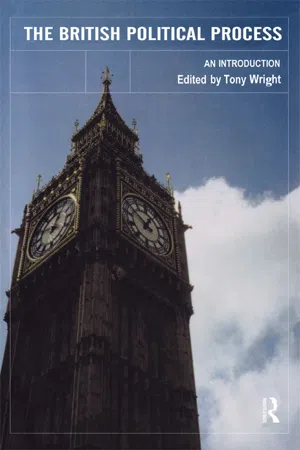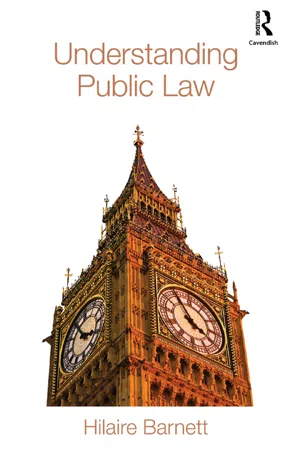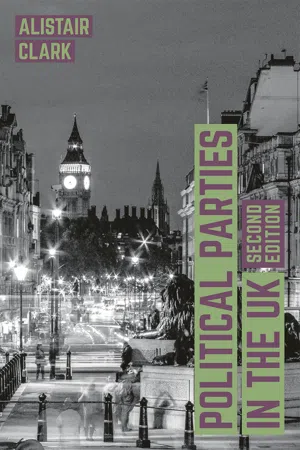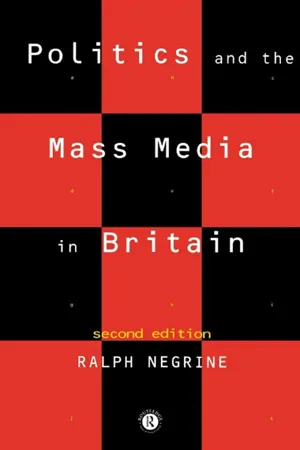General Elections UK
General Elections in the UK are national elections held to elect Members of Parliament (MPs) to the House of Commons. They typically occur every five years, but can be called earlier under certain circumstances. The party that wins the majority of seats in the House of Commons forms the government, and the leader of that party becomes the Prime Minister.
4 Key excerpts on "General Elections UK"
- eBook - ePub
The British Political Process
An Introduction
- Tony Wright(Author)
- 2002(Publication Date)
- Routledge(Publisher)
...3 Elections and electors Every man who is not presumably incapacitated by some consideration of personal unfitness or of political danger is morally entitled to come within the pale of the constitution. (William Gladstone, May 1864) We regard it as important for the health of the democratic and political system that participation in the electoral process be as high as possible. (Home Affairs Select Committee, Electoral Law and Administration, HC 768 1997–8, paragrap. 8) INTRODUCTION Elections are the essential underpinning of British politics. They determine party strengths in Parliament and the political make-up of the government. The rules under which elections are run are therefore crucial to the political process. This chapter outlines the shape of current electoral law, now subject to rapid change following the introduction of new forms of election for the devolved assemblies in Scotland and Wales and for the European Parliament, and assesses the significance of voting patterns in recent elections. There are also proposals for electoral reform for Westminster which may have an irreversible effect on the shape of British politics and these are discussed too. THE FRAMEWORK OF ELECTIONS The rules governing elections might seem to be a subject with little immediate relevance, but electoral law and procedures provide the framework for the wider political process. The mechanics of elections in Great Britain owe much to the historical background of the nineteenth century, where the right to be included in the political nation was extended gradually from the political elite of the eighteenth century to the respectable working men of the nineteenth. The nature of British democracy today cannot be understood without reference to the continuing influence of this evolutionary route to democracy (see box, pp...
- eBook - ePub
- Hilaire Barnett(Author)
- 2009(Publication Date)
- Routledge-Cavendish(Publisher)
...Chapter 8 Electoral law CONTENTS Introduction The franchise Constituencies General elections and by-elections Financial limits Election broadcasts Corrupt practices Challenging an election result Voting systems General elections and local council elections The additional member system The single transferable vote The alternative vote The party list system The funding of political parties State funding Referendums Summary Further reading Self-assessment questions Sample examination questions KEY WORDS AND PHRASES By-election an election in a single constituency caused by death/resignation of incumbent representative Constituency district or body of voters returning an elected representative to a legislature Democracy government by the people or their elected representatives Franchise the right to vote General election a country-wide election of all Members of Parliament Mandate the approval of a policy by the people in an election or referendum Proportional representation a voting system resulting in the number of parliamentary seats won being proportionate to the number of votes. cast Simple majority system a voting system under which the winner must only secure one more vote than the other candidates Introduction The Head of State in Britain is the Monarch: an inherited position. However, while kings and queens in centuries past wielded vast power, since the Bill of Rights 1689 those powers have been residual – powers that remain at Parliament’s will. While the history of political parties and elections is beyond the scope of this work, for the sake of brevity this history may be described as the gradual ‘democratisation’ of Britain. It was the nineteenth century that produced the most extensive reform of the electoral system, with many of the restrictions and prohibitions on voting being gradually removed. The greatest historical discrimination in the right to vote related to the property-less working class and to women...
- eBook - ePub
- Alistair Clark(Author)
- 2018(Publication Date)
- Bloomsbury Academic(Publisher)
...This comprises some ephemeral small organisations and local candidates. It also comprises a number of smaller parties which became significant actors in their own right, such as UKIP, and which are discussed in chapter seven. Whether this simplifies or confuses choice for voters is debatable. Rather than parties having a declining role in structuring electoral choice, it can be argued that parties actually offer more choice in Britain than they ever have. Political parties are meant to play a central role in educating citizens about politics. Competing for election means that parties must, at minimum, set out what they stand for and what their policies are during election campaigns. They must then communicate this to voters, thereby attempting to persuade them of the merits of their party’s arguments. This has an educational role since it feeds into what one country’s constitution suggests is the main purpose of political parties, ‘forming the political will of the people’ (German Basic Law Article 21). Viewing this from an integrative perspective suggests a more active role for parties, with party organisations providing information direct to voters, being active in local communities and enabling political debate to take place. The extent to which parties in the UK have been able to educate voters directly is debatable. It is unlikely that any ‘golden age’ of direct party activity existed in the way that some suggest (Scarrow, 1996: pp.194–5). While parties must indeed set out their position and attempt to persuade voters of their case, the size of the electorate in advanced democracies means that this is essentially done via the media. Analysts are divided about whether this has an impact on political behaviour. Lloyd (2004) argues that the media have a detrimental effect on political life, portraying parties and politicians in negative terms and routinely distrusting and questioning their messages. Norris et al...
- eBook - ePub
- Ralph Negrine(Author)
- 2003(Publication Date)
- Routledge(Publisher)
...9 Political Communication The Mass Media and General Elections Introduction Few events typify the concern over the political importance and effect of the mass media more than the coverage of general elections. In these political struggles, which are seen by many as the hallmarks of a democratic political system, one can detect at least two separate, though not distinct, sets of issues which in their quite different ways hint at the media’s political importance. First, it is suggested that the work of the media, and particularly the presentation and coverage of political contestants, can affect voter behaviour and choices; second, it is claimed that the journalistic practices, for example the nature of television’s never-ending thirst for moving pictures, have an impact on the nature of the political struggle and political debates. The first, and by far the older set of issues, focuses on whether the mass media can influence and change political choices. This research area has been investigated by many and, to date, the conclusions are by no means clear-cut. The empirical evidence derived from studies which focus on election campaigns is open to conflicting interpretations (see below) and the controversy is further compounded by major reservations about the validity of only focusing on electoral campaigns rather than the longer term. Unlike American presidential election campaigns which start many months before the actual election date, British general election campaigns usually last three to four weeks. During that period, political activity increases enormously as all attention is turned to the outcome of the election race...



